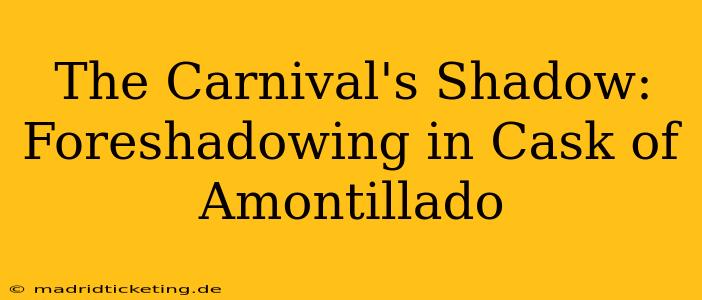Edgar Allan Poe's chilling tale, "The Cask of Amontillado," isn't just a story of revenge; it's a masterclass in suspense built upon layers of masterful foreshadowing. From the very first sentence, Poe subtly plants seeds of doom, guiding the reader towards the gruesome climax while maintaining a captivating air of mystery. This exploration delves into the subtle and overt foreshadowing techniques employed, highlighting how Poe expertly manipulates the narrative to create a truly terrifying and unforgettable experience.
The Setting: A Carnival of Death
The story begins during carnival season, a time of revelry and masking. This seemingly festive backdrop acts as the first layer of foreshadowing. The masks worn during carnival, concealing identity and allowing for anonymity, mirror the deceptive nature of Montresor himself. His jovial demeanor hides a cold, calculating heart intent on enacting a brutal revenge. The chaotic, unpredictable nature of carnival subtly reflects the chaotic and unpredictable path to Fortunato's demise. This juxtaposition of festivity and impending doom creates an unsettling atmosphere from the outset.
How does the setting foreshadow the events of the story?
The carnival setting serves as a powerful symbol of deception and hidden intentions. The revelry and masked figures represent the surface appearances that Montresor skillfully uses to lure Fortunato into his deadly trap. The festive atmosphere contrasts sharply with the dark and sinister plot unfolding beneath, creating a sense of foreboding that pervades the entire narrative. The chaotic energy of the carnival mirrors the chaotic and ultimately fatal course of events that Montresor orchestrates.
Montresor's Calculated Deceptions: Ominous Words and Actions
Montresor's words and actions throughout the story are peppered with ominous foreshadowing. His repeated insistence on Fortunato's need to confirm the Amontillado's authenticity foreshadows Fortunato's ultimate vulnerability. Montresor's seemingly courteous and concerned behavior is a calculated deception, masking his true intentions. He uses flattery and appeals to Fortunato's pride to manipulate him, subtly hinting at his own deceptive nature.
What are some examples of Montresor's deceptive language?
Montresor employs subtle but powerful language to manipulate Fortunato. His feigned concern for Fortunato's health ("You are unwell, indeed.") is a stark contrast to his true intentions. He constantly uses flattery ("You are a man to be missed"), playing on Fortunato's vanity and self-importance to lure him deeper into the catacombs. This manipulative language foreshadows the terrible consequences that await Fortunato.
The Catacombs: A Tomb Awaiting
The descent into the catacombs serves as a potent visual metaphor for Fortunato's impending doom. The damp, dark, and claustrophobic environment mirrors the oppressive atmosphere of the narrative, further foreshadowing the tragic end. The family catacombs themselves act as a symbolic tomb, prefiguring Fortunato's fate within their cold embrace. The very architecture of the setting foreshadows the imprisonment and ultimately, death, that awaits Fortunato.
How does the descent into the catacombs symbolize Fortunato's fate?
The journey downwards into the catacombs symbolizes a descent into death. The increasingly confined spaces, the dampness, and the darkness all represent the closing in of Fortunato's life. Each step further into the catacombs is a step closer to his demise, making the descent a chilling foreshadowing of his inevitable end.
Fortunato's Own Pride: A Fatal Flaw
Fortunato's excessive pride and his susceptibility to flattery are key elements foreshadowing his downfall. His insistence on proving his expertise in wine, despite his increasingly impaired state, underscores his fatal flaw. This pride, combined with his intoxication, makes him an easy target for Montresor's manipulative tactics. His arrogance blinds him to the danger he's in, further emphasizing the inevitable tragic outcome.
Does Fortunato's behavior foreshadow his fate?
Absolutely. Fortunato's overwhelming pride and arrogance become his undoing. His insistence on judging the wine, even while clearly intoxicated, demonstrates a lack of judgment that ultimately leads to his demise. This blind confidence in his abilities foreshadows his inability to recognize the danger he's in until it's too late.
The Unreliable Narrator: A Twist of Foreshadowing
Montresor himself, as the unreliable narrator, acts as a unique form of foreshadowing. His calm and detached recounting of the events, even while describing his horrific actions, creates a sense of unease and anticipation. The reader is aware of the narrator's untrustworthiness, which inherently foreshadows that the details presented might not be the whole truth. This creates a subtle but powerful form of foreshadowing, adding another layer of suspense to the narrative.
How does Montresor's narration function as foreshadowing?
Montresor's cool, detached tone throughout the narrative foreshadows the brutality of his actions. His calm description of the murder contrasts sharply with the horrific nature of the crime, creating a sense of disquiet and anticipation. The reader is left to question the reliability of the narrator, adding a layer of uncertainty that further enhances the story's suspenseful nature. This creates an inherently unsettling foreshadowing mechanism.
In conclusion, "The Cask of Amontillado" is a masterpiece of foreshadowing. Poe skillfully employs a variety of techniques, from setting and character traits to narrative structure, to build suspense and prepare the reader for the horrifying climax. The story stands as a testament to Poe's mastery of suspense and his ability to create a chillingly unforgettable tale.

